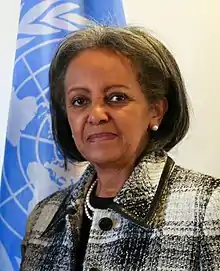| ||||||||||||||
| ||||||||||||||
| ||||||||||||||
 |
|---|
A snap presidential election was held in Ethiopia on 25 October 2018, prompted by the resignation of incumbent Mulatu Teshome.[1][2] It was the fifth presidential election of the Federal Democratic Republic of Ethiopia to elect its fourth president.[3]
Diplomat Sahle-Work Zewde was elected without contest to a six-year term, becoming Ethiopia's first non-royal female head of state[4][5] and the first female head of state since the death of Empress Zewditu in 1930.[1]
Background and electoral process
As a parliamentary republic, most administrative power and the effective ability is vested in the prime minister and his government, rather than the president, leaving the president as primarily a figurehead executive. However, the president retains significant Reserve powers granted by the constitution.
A presidential candidate is required to be elected by a joint session of the upper house and lower house of the Ethiopian parliament, the Federal Parliamentary Assembly, the House of Federation and the House of People's Representatives, respectively.[6]
The outgoing president, Mulatu Teshome had been elected in 2013 to a six-year term ending in 2019, but resigned for unspecified reasons, necessitating an early election.[1]
References
- 1 2 3 "Sahle-Work Zewde named Ethiopia's first woman president". Al Jazeera English. 25 October 2018. Retrieved 26 October 2018.
- ↑ "Ethiopian President Mulatu Teshome resigns amid Cabinet reshuffle, state media says". www.msn.com. Retrieved 26 October 2018.
- ↑ "Ethiopia Election Guide". International Elections Guide. IFES. Retrieved 19 June 2013.
- ↑ "Ethiopia gets first female president". BBC News. 25 October 2018. Retrieved 26 October 2018.
- ↑ Adebayo, Bukola. "Ethiopia appoints its first female president". CNN. Retrieved 26 October 2018.
- ↑ "Ethiopian president reelected for new six-year-term" Archived 11 October 2007 at the Wayback Machine, AFP, 9 October 2007.
